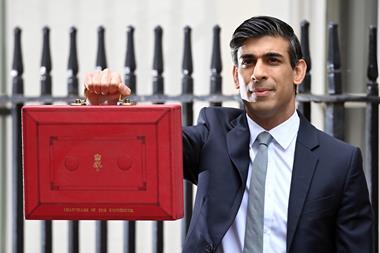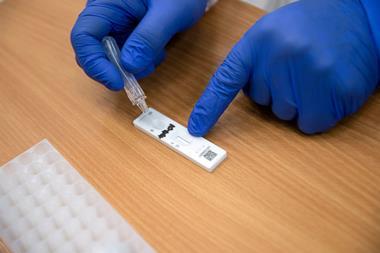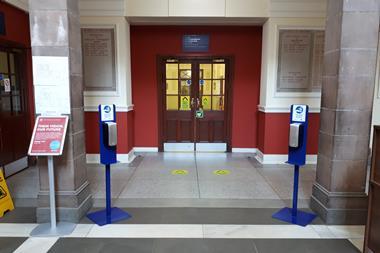Chemistry departments in England are preparing for the return of undergraduate students to teaching laboratories. The government’s roadmap to lift the coronavirus lockdown allows for students on practical courses to return to campuses from 8 March. Campuses currently remain closed to students in the UK’s other three nations.
In a statement, Tim Bradshaw, the chief executive of the Russell Group, welcomed the move. ‘Our members have worked hard to make campuses Covid-secure, with twice-weekly testing and very low overall infection rates this year – even with students from high-priority courses already back on campus,’ he said. ‘Whilst we understand the importance of easing lockdown in a cautious and controlled way to ensure further tightening of measures are not required, we would urge the government to consider whether more students can return to in-person teaching at the roadmap’s first review point in early April. An earlier return will be particularly beneficial for the mental health and well-being of students.’ However, the University and College Union has warned that the reopening of campuses is ‘irresponsible and risks undoing the country’s hard work to get Covid-19 rates down’.
Chemistry World contacted 20 chemistry departments to find out how universities were reacting to the new guidelines. Of those that responded, the majority were planning to readmit undergraduate students for practical sessions this week. However, most are making allowances for those students who would prefer to study remotely.
Universities have differing interpretations of the government’s guidelines – while some have allowed final year students to continue project work in research laboratories over the recent lockdown, other departments are preparing to admit undergraduates for the first time since the autumn term. And while some are planning to allow all year groups back for practical classes at the earliest opportunity, others are taking a more restrictive approach.
‘Currently, we are planning to [allow] some of our undergraduate student cohorts back to our labs in Bristol and this will be a welcome step back to normality,’ said Emma Raven, head of chemistry at the University of Bristol. Speaking earlier last week, Raven noted that there were still some operational issues to finalise around social distancing and the number of people in the building, but that her department was ‘confident that this can be done safely’.
Safety first
‘What everybody’s had to do is to work out how many people you can have in any lab at any one time to be safe,’ says Steve Howdle, head of chemistry at the University of Nottingham. ‘Chemistry labs are extremely good, because they’re well vented – all the fume cupboards are operating all the time and shifting the air inside the lab. So actually, in any university campus the chemistry labs are probably amongst the safest places to be.’
Explaining the Covid-19 safety protocols his department has put in place, Howdle notes that hand-sanitising stations have been set up, while corridors have been assessed to ensure they are wide enough for people to pass each other safely, with one-way systems introduced in some areas.
In the laboratory, students will be required to wear both masks and face visors on top of their usual personal protective equipment – lab coats, gloves and safety glasses. Due to lost time, the number of practical sessions each student will participate in has been cut, while Nottingham’s teaching lab – which would usually accommodate 120 students – will operate at less than half of its capacity. ‘All we’re trying to do is cover enough of the chemistry for each year group, so they can satisfactorily pass to the next year or graduate,’ says Howdle.
Further precautions will minimise the interaction between returning students. ‘We’ve got pods of undergraduates and demonstrators who come in together,’ he says. ‘If they’re coming for one day, the same pod and the same demonstrator will be together on the next day – so that should there be some form of infection within that pod, we can take that pod out.’
Nottingham is also planning to stagger the return of undergraduate year groups, with third and fourth years returning this week. ‘Fourth years are carrying out research projects so are joining our research teams,’ says Howdle. ‘Second and first year students will come back in that order for lab classes a little later, after the formal Easter break, by which time the third years will have finished their lab classes,’ he adds. ‘All students have a choice and we do have some who have chosen to study remotely. So in that respect there is a voluntary aspect – no student is being “forced” to return.’
‘It is also the case that we have some staff who are vulnerable or are caring for others and in those cases we have also made provision for allowing individuals to step out of laboratories,’ adds Howdle. ‘All of our other teaching is online and is proceeding as normally as possible in this strange world we all find ourselves in.’
Catching up
Many of the departments Chemistry World heard from are planning to introduce catch up classes or ‘laboratory boot camps’ in the next academic year, to help bring students who have missed out on practical sessions up to speed. Some are also exploring the possibility of extending their academic term to allow students to catch up on missed lab time.
Some departments will not restart teaching laboratories this week. ‘We have decided not to request any return of students from 8 March for the remainder of our Lent term, which finishes on 19 March,’ explains James Keeler, the head of chemistry at the University of Cambridge. ‘It did not seem sensible to drag students back for a very short period of practical teaching or a short time on their research project. In addition, to suddenly disrupt all the arrangements we had carefully made seemed not to be sensible, either.’
Keeler explains that students at Cambridge would not normally undertake any further practical work in the Easter term, which is reserved for lectures, tutorials and revision for the end-of-year exams. ‘We hope that as many students as possible will return for the Easter term and that they will be able to do exams in person in late May/June, subject to acceptable risk assessments,’ he says. ‘We also hope that it will be possible to have some face-to-face teaching in the Easter term – this will not be lectures, but supervisions (tutorials) in small groups may be possible. Again, this is all subject to the prevailing conditions allowing it.’
‘Above all, we want the students back so that they can benefit from some “proper” education and ‘enjoy a “proper” student experience: we have all spent too much time staring at screens lately. It is a poor substitute for real education and real life,’ adds Keeler. ‘The loss of hands-on practical work has been the most regrettable consequence of the current lockdown. We are planning ways in which students can catch up on some of what they have missed.’

















1 Reader's comment